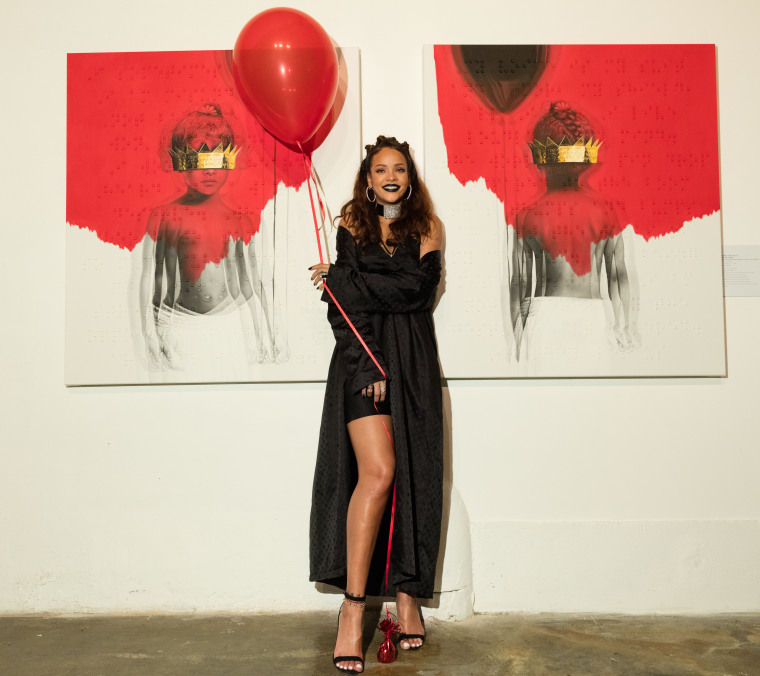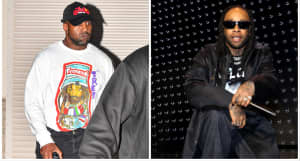 Photo by Christopher Polk / Getty Images
Photo by Christopher Polk / Getty Images
The weekend of MLK Day, Future announced via Twitter that his new mixtape Purple Reign would be dropping at 11:56 p.m.—just an hour from when he posted the tweet. But by the time the rapper’s curiously specific deadline had passed, and despite #Futurehive transforming Twitter into a whirlwind of purple umbrella emojis, there was no mixtape. Instead, the platform the rapper chose for the release, Livemixtapes, tweeted that Purple Reign was in fact still being worked on. Posts about that mixup were only seconds old before another strange thing happened. In a series of seemingly rushed tweets, Kim Kardashian West responded to Kanye fans who were upset about the delayed release of “No More Parties in L.A." that Kanye, too, was putting the final touches on the track: “This is the 1st song ever with Kanye & Kendrick Lamar! He just landed & headed straight to the studio to finish it!!!” Kim tweeted.
For big-name artists with a new album coming out, the promotional period before the release is nearly as important as the music. These musicians, the ones whose fans have elaborate nicknames, have to decide which platform they’ll usher tens of millions of people to when the record drops and, most importantly, how they’ll keep their fans' attention while they’re waiting for the music to arrive. "Hiccups" like Future’s miscalculated timing or Kanye’s last-minute changes actually aren’t as detrimental to this goal as they seem—and they might even be part of a carefully considered plan. There’s value in generating a big conversation online, and if millions of people are chattering about your album in the run-up to release that's as ideal a situation as one can get.
“Hiccups” like Future’s miscalculated timing or Kanye’s last-minute changes aren’t as detrimental to an album rollout as they seem—and they might even be part of a carefully considered plan.
When Rihanna rolled out her Samsung-sponsored virtual reality app AntiDiary back in late November, the idea was for fans to unlock eight virtual rooms, one a week; seven would contain mysterious promotional videos for her much anticipated eighth LP, ANTI, with the eighth and final room set to contain a free download code for the first million fans to access it, via Tidal. What happened instead—a “system error” that resulted in Tidal leaking a stream of the album for a short time before it was officially released two hours later—wasn't by the script but that didn't hurt ANTI. Rihanna's Samsung and Tidal collaboration had provided fans who took part in the AntiDiary app a free download code, which helped it reach platinum album status in less than two days, and Rihanna made the artistic album statement she wanted to.
In fact, the messiness of the rollout was in part what kept Rihanna a topic of conversation. After the long, speculation-fueled wait, when it came to the actual release, journalists had to report on both the leak and the album. For a moment, the musician had just about everyone’s attention. Maybe the drama would have dominated conversations for longer were it not for another notable album shakeup from, again, Kanye West.
In a casual tweet last week, Kanye scratched SWISH as a title and renamed his forthcoming album, Waves, which seems like a little bit of a sloppy move less than a month out from the stated Feb 11 release date, and raises questions about how finished the rest of the record is. The day after—the same day Tidal briefly leaked ANTI—Kanye further muddied the water by embroiling himself in a controversy involving Wiz Khalifa and Amber Rose. The former, miffed at Kanye’s use of incarcerated rapper Max B’s signature word “waves” for his album title, had a few words for Yeezy on Twitter, to which Kanye responded with a brutal 20-tweet shellacking of Khalifa, during which he made the ill-advised choice of involving former partner Amber Rose. Still, one of Ye’s now-deleted tweets effectively sums up the scuffle: “Thank you for the extra promotion #WAVES available February 11th.”
According to data from Twitter, Kanye's tweets were seen over 400 million times during his confrontation with Wiz. Twitter even packaged the spat in one of its newly released Moments features, in which a collection of tweets about Yeezy were presented in an easily comprehended slideshow.
There’s no question that all of this chatter—very little of which is actually about music—will only increase the amount of people talking about Kanye’s album. Just as Rihanna fans’ frustration with the strangeness of ANTI’s rollout ultimately made for premium meme fodder, Kanye’s Twitter Moment points to a shifting paradigm in how fans interact with musicians.
This week, the Recording Industry Associate Of America, or the RIAA, officially began counting streams in its measurement of platinum records. The distinction was a long time coming, as the way we consume music—and almost everything for that matter—has fundamentally changed with the internet. The conversation surrounding musicians and music is today as valuable as the music itself. It’s why artists are using emojis to communicate more authentically to their fans, and becoming miniature media enterprises in the process. In 2016, the chatter and speculation around a release hasn’t changed, it’s just been incorporated into the process.


